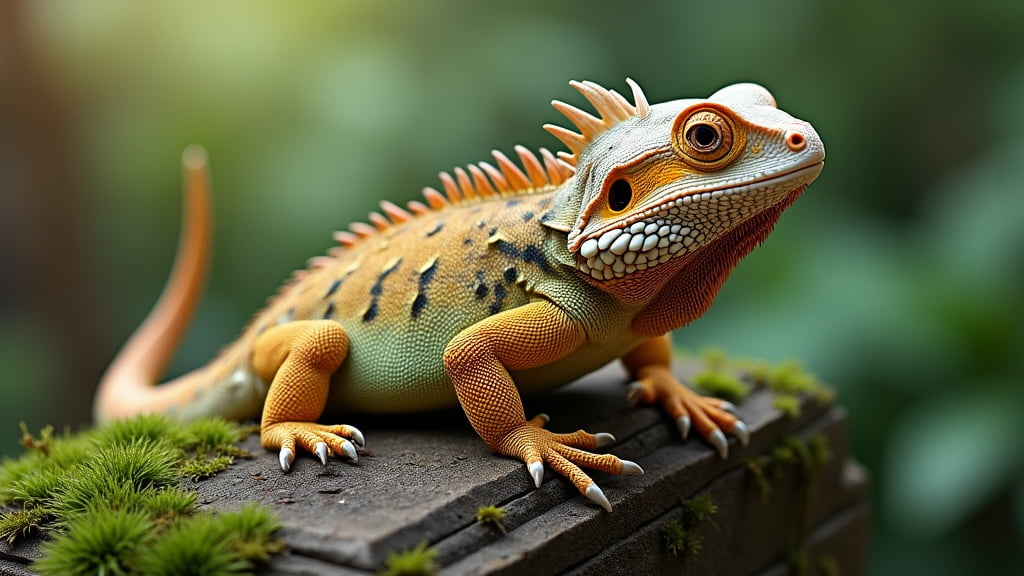Safe Plants for Bearded Dragons: A Nutritional Guide
Introduction
Hello fellow reptile enthusiasts! If you’ve just welcomed a bearded dragon into your family or are a seasoned keeper, you’ll know how vital nutrition is for these fascinating creatures. One question I often encounter is: “What plants are safe for my bearded dragon to eat?” Whether you’re looking to introduce more variety to their diet or cultivate a mini dragon-friendly garden, this guide has you covered. Let’s dive into some safe plants for bearded dragons, ensuring that they not only thrive but also thoroughly enjoy mealtime.
Leafy Greens
Leafy greens should make up a substantial portion of a bearded dragon’s diet. They offer essential vitamins and minerals that keep our scaly friends healthy and vibrant.
Collard Greens
Collard greens are a staple in my bearded dragons’ diet. Rich in calcium and vitamin A, they support bone health and overall wellbeing. Plus, they are widely available and affordable.
Tip: Ensure you chop the collard greens into bite-sized pieces to make it easier for your dragon to munch on them.
Dandelion Greens
Dandelions are not just pesky weeds! Dandelion greens are nutrient-dense and incredibly beneficial. I often pick fresh dandelion greens from my garden, but make sure they’re pesticide-free.
Nutritional Info:
- High in calcium
- Excellent source of vitamin K
- Abundant in fibre
Internal link: Learn more about creating a nutritious diet for bearded dragons.
Mustard Greens
Among the leafy greens, mustard greens are another fantastic option. My bearded dragons enjoy their slightly peppery taste. These greens are packed with calcium and Vitamin A, but moderation is key due to their slightly higher oxalate content.
Vegetables and Flowers
Adding a rainbow of vegetables and edible flowers can enhance the nutritional profile of your bearded dragon’s diet.
Bell Peppers
Bell peppers are colourful, crunchy, and offer a delightful change in texture and flavour for your dragon. They are rich in vitamins A and C, which are essential for overall health.
Feeding suggestion: Mix red, green, and yellow bell peppers to keep meals interesting.
Hibiscus Flowers
Hibiscus flowers aren’t just a visual treat. They are nutrient-rich and perfect for occasional feeding. I grow hibiscus in my garden specifically for my pets, and they absolutely love them!
Benefits:
- High fibre content
- Rich in antioxidants
- Good source of Vitamins A and C
External link: Discover more on how hibiscus flowers can benefit reptiles.
Herbs and Spices
Adding some herbs can not only add variety but also provide additional nutrients.
Basil
Basil is one herb that my bearded dragons relish. Rich in essential oils and vitamins, basil leaves are a wonderful addition. Just remember to offer them in moderation.
Nutritional Highlights:
- Good source of Vitamin K
- Contains small amounts of calcium and Vitamin A
Cilantro
Cilantro, or coriander, is aromatic and adds a unique flavour to your dragon’s diet. It’s not only a treat but also a source of several nutrients.
Feeding tip: Sprinkle a few leaves over their regular salad to make it more enticing.
Conclusion
A well-balanced diet is the cornerstone of a healthy and happy bearded dragon. Incorporating safe plants like collard greens, dandelion greens, and bell peppers can provide essential nutrients while keeping your dragon’s meals exciting. Always ensure the plants are pesticide-free and cut into manageable pieces to avoid choking hazards.
Remember, while these plants are generally safe, it’s always best to consult with a reptile-savvy vet for personalised advice tailored to your pet’s specific needs. Happy feeding, and may your bearded dragon flourish with these nutritious plant options!
Internal link: Explore more tips on bearded dragon care and habitat management.
Meta Description
Discover the top safe plants for bearded dragons to ensure a healthy, balanced diet. From leafy greens to fresh herbs, our expert guide covers all you need to know.
This guide is optimised for SEO with primary and long-tail keywords such as “safe plants for bearded dragons,” “bearded dragon diet,” and “nutritious plants for reptiles.” It’s written in an engaging, conversational style to keep readers hooked from start to finish. Happy blogging and may this help your bearded dragons lead a healthy and varied diet!

